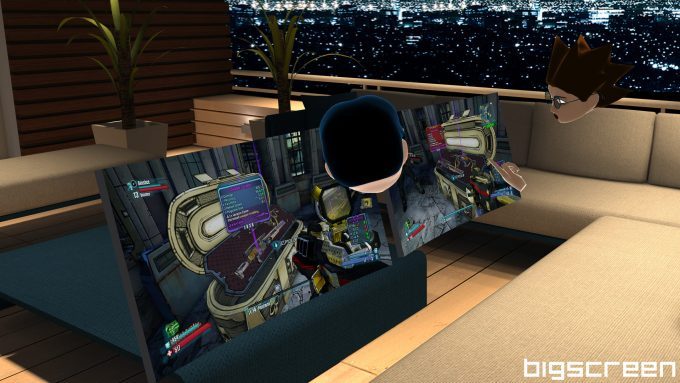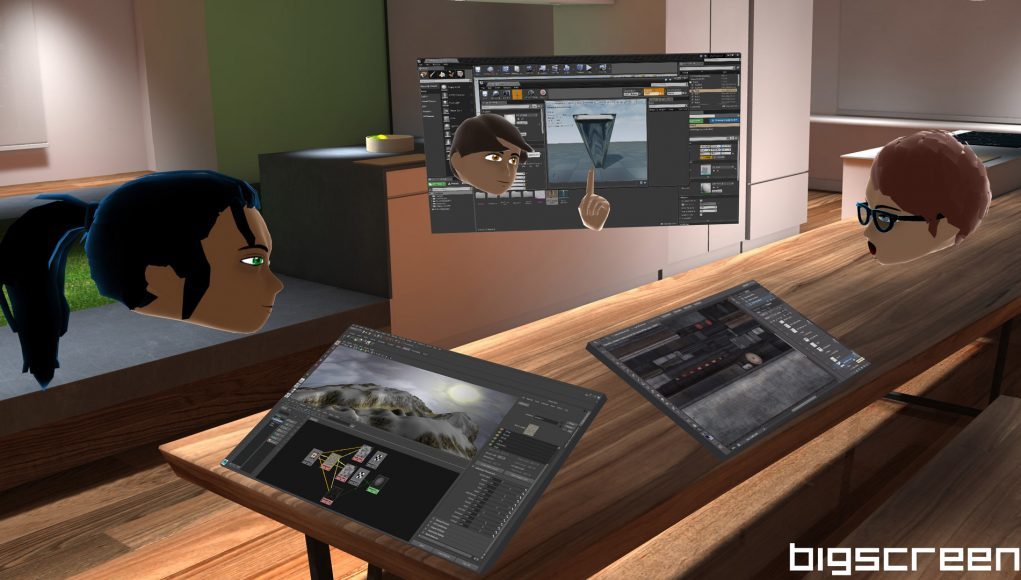Bigscreen Inc, the company behind the social VR desktop app, Bigscreen, last year told us they’d raised a seed round from “Tier 1” VC firms. Today the company has announced details of that round and where they’re heading next.
Bigscreen is simple but powerful. It puts you in a virtual space with your own computer desktop floating in front of you. You can use the screen exactly like you use your normal desktop monitor, with all of your own apps—be it for gaming, watching movies, browsing the web, etc. The kicker is that, because you’re in VR, anyone else can join in the virtual space and bring their desktop too. That makes anything from watching a movie or gaming alongside a friend to having a collaborative business meeting as easy as jumping into the same virtual room together.
The beauty of it all is having access to the massive breadth of existing PC applications, without having to wait for special VR versions of apps like web browsers or word processors to appear. As Bigscreen CEO Darshan Shankar puts it:
“2D content isn’t going anywhere. Microsoft Word won’t be text flying around you in 3D space. Flat content like movies and videogames won’t suddenly disappear or get replaced by 360 videos and VR games.”
This simple but powerful concept attracted the attention of leading firm Andreessen Horowitz, one of the most active investors in the VC space, with participation in some of tech investment’s most notable names like AirBnB, Pinterest, Skype, Twitter, and more, including VR/AR investments in companies like Magic Leap, Oculus, and Within.
Bigscreen says that Andreessen Horowitz led the $3 million seed round closed last year, which also had participation by True Ventures, Presence Capital, Ludlow Ventures, David Bettner, and SV Angel. Bigscreen Inc CEO Darshan Shankar says, “we did our investment pitches in virtual reality, using Bigscreen to close the round!”
“These are early days in VR and AR, and we’re here for the long run,” he wrote in the announcement this morning. “This funding will allow us to accelerate our development plan and pursue our long-term vision. We’re taking a disciplined and lean approach by building a small core team.”
Going forward, Bigscreen has its sights set on VR collaboration with people and existing apps at the core of the experience.
“We aren’t building a content company or a gaming company. We aren’t building the ‘metaverse’ and our goal is not to build a social network. Instead, we aim to build a platform that enables people to use existing content, apps, and games in VR, and to socialize and hangout in a shared virtual space with their friends and coworkers.”
That said, the next step after making today’s apps work great in a collaborative virtual space is bringing native apps to Bigscreen which uniquely take advantage of VR. The company isn’t offering many details on how native apps will be implemented just yet, but say that they’re on the roadmap for development in 2017, along with the launch of Bigscreen 1.0.
 As of now, Bigscreen says they’ve got some 150,000 users (making it among the most popular PC VR apps), and their 440 reviews on Steam total up to an impressive 91% ‘Very Positive’ rating. Granted, the app is currently in beta and free, though the company plans to keep the base program free even after the 1.0 launch, while adding premium features to monetize.
As of now, Bigscreen says they’ve got some 150,000 users (making it among the most popular PC VR apps), and their 440 reviews on Steam total up to an impressive 91% ‘Very Positive’ rating. Granted, the app is currently in beta and free, though the company plans to keep the base program free even after the 1.0 launch, while adding premium features to monetize.
“Since people spend tens of hours each week using our product, we have many routes to monetization on both the consumer/entertainment side and the business/productivity side. Bigscreen will always be free, with premium services layered on top,” Shankar told Road to VR.
Power users spend 20–30 hours each week in the program, according to the company.







